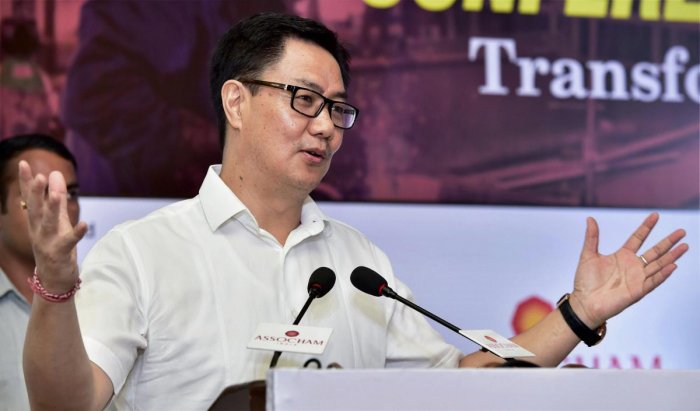
Centre wants govt nominees in panel for appointment of SC, HC judges

In an escalation of tug of war between the Centre and the Supreme Court, Union Law Minister Kiren Rijiju has shot off a missive to the Chief Justice of India (CJI), DY Chandrachud, suggesting that the Supreme Court Collegium that decides on appointment of judges should include government representatives.
In his letter to the CJI, the Law Minister said the move will “infuse transparency and public accountability”. The letter, Rijiju, said is “just a follow-up action of letters written earlier to the Chief Justice”. He asserted that the Supreme Court constitution bench had talked about a possible restructuring while striking down the National Judicial Appointment Commission (NJAC). Interestingly, his letter also makes a pitch for state government representatives in the High Court collegium.
Kejriwal terms the move as “dangerous”
Meanwhile, the opposition parties have taken a strong exception to the Union Law Minister’s assertion. Delhi Chief Minister and AAP convener Arvind Kejriwal dubbed the move “dangerous” in a tweet. “This is extremely dangerous. There should be absolutely no government interference in judicial appointments,” tweeted the AAP chief.
Also read: SC Collegium recommends elevation of 7 judicial officers, 2 advocates as judges of different HCs
Judiciary often flayed for ‘lack of transparency’
Incidentally, earlier too, several ministers, including Rijiju, have flayed what they termed “opaqueness” of the judiciary while contending that the government should have a say in selection of judges, which has been a domain of the Supreme Court since 1993.
Rijiju has expressed his opinion on the vexed issue on various occasions in the past. He has called the collegium system “alien” to the constitution while strongly resenting “any system in which the government has no right to appoint judges”. He has also come down heavily on the apex court for scrapping the National Judicial Appointments Commission (NJAC) set up by the BJP-led government in 2014. The commission would have comprised members of the government and the judiciary.
Dhankhar too echoed similar sentiments
Vice-President Jagdeep Dhankhar too has come out with similar views on multiple platforms. Presiding over the Upper House for the first day on the opening day of the Winter Session of Parliament on December 7, he termed the striking down of the NJAC Act a “severe compromise of the parliamentary sovereignty and disregard of the mandate of the people”. He also raised a question on the landmark 1973 Supreme Court verdict that said parliament can amend the Constitution but not its basic structure.
Also read: Supreme Court dismisses plea seeking details of collegium meeting
Apex court defends collegium system
However, the Supreme Court has firmly defended the collegium system. The Supreme Court has said the collegium system is the “law of the land” which should be “followed to the teeth”. It would not cease to be the law “just because some sections of society expressed a view against the collegium system”.
The Supreme Court Collegium currently comprises Chief Justice Chandrachud and Justices Sanjay Kishan Kaul, KM Joseph, MR Shah, Ajay Rastogi and Sanjiv Khanna.


